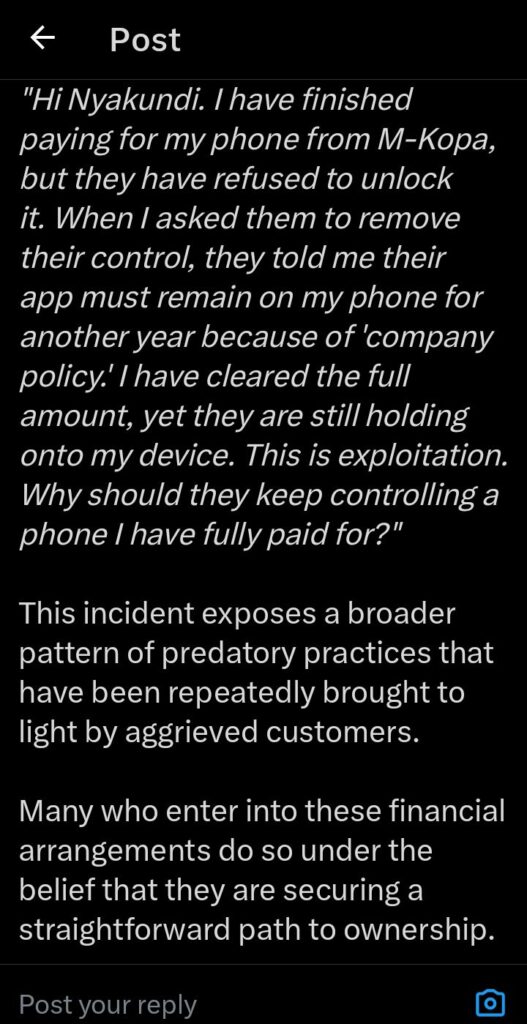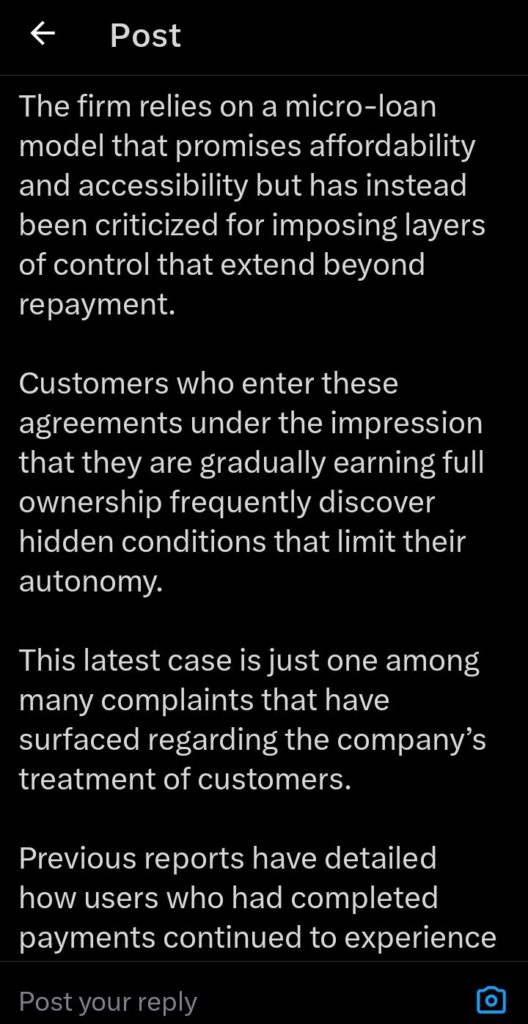M-Kopa is once again facing heavy criticism over its exploitative business practices, with fresh complaints emerging about its continued control over devices even after customers have completed their payments.
A recent case has put the company back in the spotlight after a client who had finished paying for a smartphone was shocked to learn that M-Kopa would not release full control of the device.

Despite following all repayment terms, the customer was informed that the company’s software would remain on the phone for another year, with no option to remove it.
This revelation sparked outrage, with many questioning why a customer who has fulfilled their financial obligations should still be subjected to company-imposed restrictions.
The customer, frustrated by the situation, sought an explanation from M-Kopa’s customer support team, only to receive vague responses. The company insisted that this was standard policy, offering no reasonable justification for why the software needed to remain installed.

The affected individual shared their frustration publicly, exposing what appears to be a deliberate strategy by the company to retain control over its products long after payments have been completed.The incident is not isolated, as other customers have reported similar experiences.
Many claim they were unaware of these restrictive conditions when signing up for M-Kopa’s financing plans. Once locked into the agreement, they realize that full ownership is not as straightforward as expected. Even after clearing their outstanding balances, they find themselves dealing with hidden terms that restrict their ability to use their own devices freely.

Complaints of excessive penalties, remote device lockouts, and unexplained deductions have become a common theme among M-Kopa’s customers. Those who attempt to challenge these issues are often met with automated responses and a frustratingly slow dispute resolution process.
Beyond customer grievances, M-Kopa has also faced criticism for its treatment of employees. Numerous reports suggest that workers, especially those in lower-tier positions, endure poor working conditions, toxic management, and exploitative labour policies.

Warehouse staff hired through outsourcing agencies have described harsh conditions, including extended work hours without fair compensation. Employees have raised concerns about unrealistic performance targets and intimidation tactics used by supervisors to maintain control.
There are also allegations of workplace bullying and preferential promotions based on personal relationships rather than merit.In addition to these internal issues, M-Kopa has been involved in a long-running tax dispute with the Kenya Revenue Authority (KRA) over Ksh 308.5 million.

The company has argued that its tax burden is inflated due to unpaid debts from defaulting customers. However, investigations suggest that M-Kopa may have exaggerated these figures to reduce its tax obligations.
Reports indicate that the company included customers who had purchased electric bikes on credit in its debtor records, a move that artificially inflated its losses. While regulators initially ruled in M-Kopa’s favour, there are growing concerns that the company has been using financial loopholes to avoid paying its fair share of taxes.
Despite presenting itself as a business committed to financial inclusion, M-Kopa’s actions tell a different story. Customers who expect fair treatment are instead met with restrictive policies that extend beyond repayment.

Employees who seek fair working conditions find themselves facing a culture of intimidation and exploitation. Regulators have failed to step in effectively, allowing the company to continue its questionable practices without significant consequences.
The question remains whether M-Kopa will ever be held accountable for its actions or if it will continue exploiting both customers and employees without facing real repercussions.





















Add Comment